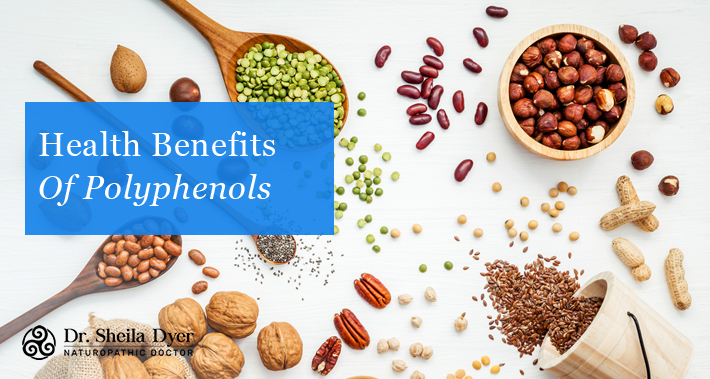Polyphenols are a type of plant compound that offers various health benefits when consumed regularly.
Some of these benefits include boosting digestion and brain health, plus protection against heart disease and type 2 diabetes.
Polyphenols can be found in a variety foods, so there are many options when it comes to integrating them into your diet.
I’m Dr. Sheila Dyer, a naturopathic doctor who offers Toronto naturopathic nutritional counselling services.
If you’re feeling overwhelmed, booking an appointment is a great place to start.
In the meantime, let’s take a look at the world of polyphenols.
What Are Polyphenols?
Polyphenols are a type of compound naturally found in plant foods like fruits and vegetables.
They can act as antioxidants, which means that they neutralize free radicals that damage your cells and increase your risk of conditions like diabetes and heart disease.
Polyphenols may also reduce inflammation, which is a common cause of many chronic illnesses.
It’s worth nothing that while there are supplements containing polyphenols out there, they are less likely to be beneficial.
It’s always best to get them from their natural food source if possible.
Types Of Polyphenols
There are more than 8000 types of identified polyphenols.
The amount and type of polyphenols varies depending on factors pertaining to the food source like origin, ripeness, storage, and how it’s prepared.
But don’t worry – you won’t have to go to the health food store and pick up 8000 different supplements.
The different types of polyphenols are sorted into four main categories.
Let’s look at some common types of polyphenols and where to find them.
Flavonoids
Flavonoids are a type of polyphenol and make up around 60% of all current polyphenols.
You can find them in high levels in foods like apples, dark chocolate, red cabbage and onions.
Phenolic Acids
Phenolic acids make up around 30% of all polyphenols and can be found in fruits, vegetables, seeds, and whole grains.
Some examples of phenolic acids are stilbenes and lignans.
Polyphenolic Amides
Polyphenolic amides is a small group that includes capsaicinoids in spicy peppers and avenanthramides in oats.
Others
Finally, this last group includes ellagic acid which is found in berries, resveratrol which is found in red wine, and curcumin which is found in turmeric.
Benefits Of Polyphenols
There are many different health benefits associated with polyphenols.
Let’s dive in to some below.
1. Promotes Cognitive Health
Foods that contain polyphenols may boost your memory and focus.
A 2020 meta-analysis of 15 different studies on the subject found it made a significant difference.
It concluded that not only could polyphenols be a useful treatment for cognitive decline, it was a very inexpensive way to do so.
2. Prevents Blood Clots
Blood clots are caused by the clumping of platelets circulating in your blood stream.
This is called platelet aggregation, and in some cases it’s beneficial.
For example, it’s how your body stops you from bleeding when you have a cut.
However, if your blood clots inside an artery, it can cause major health issues like a heart attack or stroke.
By reducing the platelet aggregation, polyphenols can help prevent blood clotting.
3.Lowers Blood Sugar
Polyphenols may also lower your blood sugar levels.
They do this by preventing the breakdown of starch into simple sugars, which reduces the possibility of a blood sugar spike after a meal.
They may also help to kick start the secretion of insulin, which is a hormone that keeps your blood sugar levels stable.
As a result, polyphenols can lower your risk of developing type 2 diabetse.
The polyphenols that are the most effective to combat diabetes are anthocyanins, which are often found in red, purple and blue foods likes berries or grapes.
4. Promotes Digestive Health
Your digestive tract is full of bacteria that play an important role in the digestive process.
Polyphenols promote the growth of beneficial gut bacteria while discouraging harmful ones; this is how they benefit digestion.
In particular, polyphenol-rich teas like green tea can promote the growth of bifidobacteria, a common element in probiotic supplements.
5. Lowers Risk Of Heart Disease
Finally, polyphenols have antioxidant properties.
Antioxidants are a key component in your body’s ongoing battle with free radicals.
Free radicals are atoms with an unstable number of electrons in your body.
They’ve been known to cause damage to your cells, which lead to a number of issues including premature aging and heart disease.
An antioxidant works by donating one of its electrons to the free radical, stabilizing it and removing its potential for harm.
Polyphenols are one of your body’s antioxidant tools.
Other antioxidants include vitamin C, melatonin, and curcumin.
Dietary Sources Of Polyphenols
The most commonly known dietary sources of polyphenols are tea, dark chocolate, red wine, and berries.
You can also find them in many fruits, vegetables, legumes, nuts and seeds.
Some examples with a high polyphenol content include clove, plums, apples, black beans, hazelnuts and even all types of soy.
Book An Appointment With Dr. Sheila Dyer, ND
Polyphenols can be found in a wide variety of foods and offer a wide variety of benefits to your overall health.
If you’re interested in adding polyphenols to your diet in a strategic way, book an appointment with me, Dr. Sheila Dyer, a naturopathic doctor in Toronto.
Book an appointment with me today, and let’s work to rebalance your body.
If you have questions about naturopathic medicine, or would like to start with your first consultation, contact me, and let’s book an appointment.
Dr. Sheila Dyer, ND1080 Dovercourt Rd,
Toronto, ON M6H 2X8
(416) 554-5135
► https://g.page/DrSheilaDyerNd
Dr. Sheila Dyer is a Naturopathic Doctor and a practicing registered nurse offering holistic healthcare with a scientific focus

